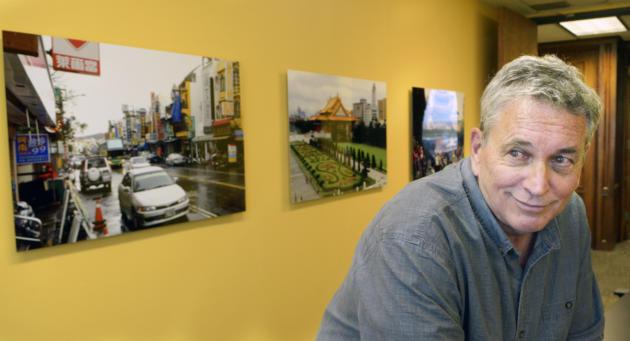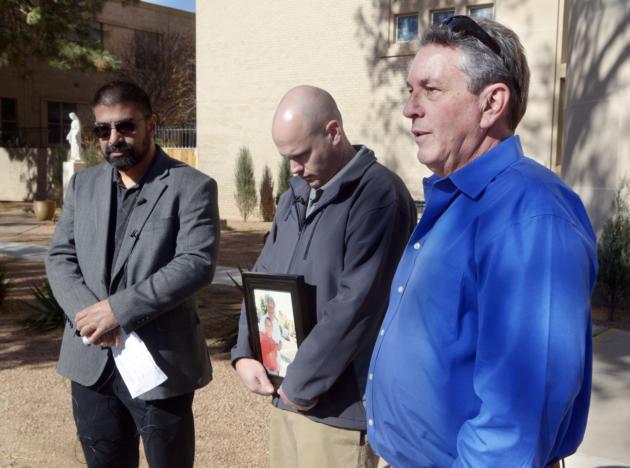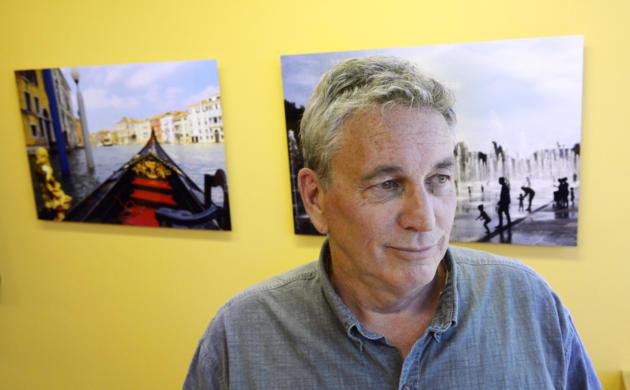|
Face to Face with Brad Hall: Fighting for victims of clergy sex abuse
By Kent Walz
Editor’s note: Albuquerque attorney Brad Hall has represented more than 200 victims of priest sex abuse in New Mexico. As his years-long legal battle nears its conclusion in federal bankruptcy proceedings, Hall talked about the legal and emotional journey that began with an unlikely visit. Brad Hall was thinking about hanging it up after more than two decades as a successful plaintiff’s lawyer specializing in civil rights cases. Maybe travel. Visit his kids living in exotic locations. Maybe do some writing. That all changed in 2011 when a former basketball teammate from a county league team in the 1980s walked into his office. “I hadn’t seen him in 20 years. But in the next three or four hours he told me how as an altar boy he had been sexually assaulted by Fr. George Weisenborn at Saint Francis Xavier in Albuquerque.” Just telling the story was a gut-wrenching experience for his former teammate. “Afterward, I watched him go out the door and head towards his car,” Hall said. “He fell to his hands and knees on the sidewalk and vomited.” It turned out to be Hall’s first case of many representing victims of sexual assault by Roman Catholic priests and clergy in New Mexico. His thoughts of retirement and travel were pushed to the background. The Archdiocese in Providence, Rhode Island, had sent Weisenborn to the Servants of the Paraclete treatment center in Jemez Springs in 1964. “He (Weisenborn) kept getting arrested in Washington, D.C., for picking up boys in back alleys for 10-15 bucks and having sexual acts performed on him,” Hall said. Watching his former teammate throw up on the sidewalk also made Hall appreciate the trauma involved when someone finally tells his or her story of abuse. Hall took the case and said it didn’t surprise him when lawyers for the archdiocese filed a motion seeking to force his client to reveal his name when typically such cases are filed on behalf of “John Does” to protect the privacy of victims. “I brought him in to discuss it and he said, ‘You know what? The gloves are on the ice. Let’s get it on.’ ” So Hall held a news conference and provided the man’s name voluntarily. “I probably could have protected it. But he took it as a personal challenge.” Media coverage resulted in calls to Hall’s office. One of them involved allegations against another priest, Michael O’Brien, who had worked in northern New Mexico. That led to another case. The trickle turned into a flood when the O’Brien case went public. “We had 30 calls immediately. It was unbelievable because apparently no one had ever accused him (O’Brien). We spent the next 40 to 50 days screening those calls with three- to four-hour interviews. … He had been moved around every couple of years. He was one of their stars in the ’80s because he put together all the Chimayó pilgrimages.” Hall said O’Brien was in charge of vocations. “You start looking at that in a different light, too … looking at the marches to Chimayó as priests and bishops in front of an army of boys like the pied piper.” Counseling required Hall has represented more than 200 victims in priest abuse cases. He and fellow attorneys Levi Monagle and Lisa Ford have worked cases not just involving the Archdiocese of Santa Fe but also Las Cruces, Gallup and El Paso. His experience with his former teammate is one reason Hall has insisted all his priest abuse clients get counseling. “If they couldn’t afford it, we would pay for it. Or we would talk to certain counselors around town or other towns about waiting for payment until settlement. And most therapists would agree because when a victim of childhood sexual abuse has their watershed moment or their childhood coping skills crumble they would just crash.” Hall represents six of the nine abuse survivors on the creditor committee for the Archdiocese of Santa Fe bankruptcy, where he has three goals:
One major legal fight still ahead is likely to involve assets that have been transferred from the archdiocese to parishes and the Archdiocese foundation in recent years. Raised Catholic Hall grew up in a middle class family on a farm in the Yellowstone River valley in eastern Montana and came to New Mexico when he was 20. He was raised Catholic. “My mom is from a family of 13 and her mom was from a family of 16 and they were Polish Catholics. They immigrated through Chicago and picked up advertising on the streets there about free land in the Dakotas and Montana.” His dad worked for the railroad. “I was about 15 when I left the church. Nothing bad happened – but I’ve since reviewed all the credibly accused lists in Montana.” Dioceses around the country in recent years have made public the names of current and former clergy alleged to have molested children. There are 73 credibly accused priests on the Archdiocese of Santa Fe list. Hall describes himself as a small-town jock who ended up in New Mexico and attended St. John’s College in Santa Fe. From there it was on to University of New Mexico Law School where he graduated in 1986. He also lived in Hobbs for almost a year employed as a bus driver, taking workers to potash mines and “as a carpenter scraping up jobs like putting a new roof on the Dairy Queen in Seminole, Texas. Things like that.” “All lawyers know that anything you do matters someday,” he said. “So I ended up with two or three police shooting cases because I had lived there.” Hall has a place in Colorado, and grumbles about the number of license plates from Texas and Oklahoma. Does he describe himself as a true blue liberal? Even that might be too far right. “My grandfather would have rolled over in his grave if he thought my mom had gone so far to the right as to vote for FDR.” Pedophiles put in charge of children Hall says he’s worked as hard the past few years as at any time in his career. The Weisenborn case was an education that involved reviewing the former priest’s personnel file from Rhode Island, which said the archdiocese there wrote to the Vatican and asked that he be “laicized because he is preying on children, he’s a drunk and he’s stealing our money.” “Instead,” Hall said, “the Vatican wrote back and said send him out to New Mexico. There’s a place called Servants of the Paraclete and they’ll take him on.” So why would the Paraclete then send him back out into ministry in New Mexico within days back in the late 1960s? “It turns out there was a priest named John Feit who allegedly murdered a 22-year-old beauty queen parishioner in Texas. Her body was found behind the church. She had been raped.” Feit fled and took up residence at the Paraclete in Jemez Springs. “I don’t know if there is a more classic example of the lunatics taking over the asylum,” Hall said. By the late 1960s, Feit had become a supervisor at the Paraclete. “His theory, not surprisingly, was that with prayer you can resolve this conflict in your own soul and get redemption, absolution and forgiveness and then do the Lord’s work from that point forward. “So if you have a problem with money I’m gonna put you in charge of money … if you have a problem with psycho sexual issues with children I’m going to put you in charge of kids.” The Paraclete was overrun with pedophile priests from all over the United States, Hall said, and Feit was able to convince then-Archbishop of Santa Fe James Peter Davis – “and luckily for us they wrote it down” – that the best way to help these priests was for them to fill in when parishes around the diocese needed a priest to cover sabbaticals or other absences. But Hall said Feit and Davis also concluded it “would be unfair to tell the parishioners this guy has a pedophilia problem. And it would be unfair to tell the other priests. It would be unfair to tell anybody so we have to keep that secret.” And, he said, all this is contained in a signed document. Feit in 2017 was prosecuted in the Texas beauty queen murder and was sentenced to life in prison. Working with Leon Hall’s first lawyer job was with Leon Taylor, a larger-than-life defense lawyer who Hall recalled once got a standing ovation from the jury when the judge tossed out the prosecution’s case. (The defendant was a dairy truck driver who had been accused by corporate headquarters in Chicago of stealing milk. In fact, he was picking up out-of-date milk and giving it to pig farmers in the South Valley.) Hall and Taylor eventually became partners. “You learn a lot watching a guy like Leon who’s fearless in a courtroom. You learn you represent your clients and you do justice as best you can under the circumstances.” Coach Hall Hall is laid back and good-humored. He left a successful law firm because he wanted to coach his kids’ youth sports and “you just can’t tell law partners I need to leave at 2 every day to coach. But it was more important to have a one-time opportunity to do Little League Baseball and AAU basketball.” He’s still the proud papa:
No religious agenda Hall says he has no ax to grind against the church. “I’m not trying to attack the Catholic Church or any other church. I’ve sued evangelical churches for sexual abuse. Christian schools for the same thing. I’ve sued Lutherans, Boy Scouts, coaches. Any position where a person is put in unchecked power over kids, eventually things don’t go well.” Hall worries about the impact on his legal team from being immersed in sex abuse cases for years and has taken steps to make sure staff didn’t get too affected. Still, he said, spending hours with each client and poring over documents is a concern. “The breach of trust and murder of that soul by those priests is profound,” he said. Hall said the concern for clients and families has meant smaller settlements. “Each case we settled, if it had been tried in a courtroom in my mind would have been worth way more with a jury. But nobody wanted to have a trial because grandma and mom and dad and wife and ex-wife and all your adult kids are going to be deposed and so on.” Is there light at the end of the tunnel? “Good question,” Hall replies. “Toward the end, before the bankruptcy petition (was filed in December), our callers were getting younger and younger. All the social science is clear that the average time between childhood sexual abuse and disclosure is over 30 years.” Does Hall think there are a lot more victims out there who have not yet come forward? “I do.” Confession Where does Hall, 63, plan to be in five years? “Living on a beach. Not Tingley Beach. Maybe Portugal or Spain or the Caribbean or Southern California.” “It’s going to take me a few years to unpack myself so maybe I’ll write five or 10 short stories or essays on things I’ve learned for the benefit of these people … and survivors, like people often say, are very brave when they come forward … it’s a huge step.” “Some people start out sobbing and crying in the first interview. Then we have to go through it again to answer interrogatories and again to prepare for a deposition and then they get deposed by lawyers for the Archdiocese and then they go to a mediation. They get better and better at it and meanwhile are in therapy.” “I’ve seen some have continued really hard times and they just come to the realization that’s it’s never going to go away. That putting a few hundred thousand dollars in the family coffers has nothing to do with it other than whatever therapeutic gain you might get from getting some accountability and an apology.” Hall says he’ll be satisfied handing the mantle to Levi Monagle and “other young lawyers out there. I’ll be satisfied if we succeed in getting this public archive set up that Archbishop Wester has committed to. And I believe him. “The public should see the truth,” he said. “Otherwise, the bankruptcy will be like a confidential settlement in an individual case. Write a check. Close the doors. Move on. Keep wallets in the pew. If you want some cynicism, there’s a good phrase.” “If you’re the archdiocese,” he said, “it’s time to go to confession.”
|
.
Any original material on these pages is copyright © BishopAccountability.org 2004. Reproduce freely with attribution.


